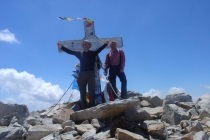How to book on a trip
Trip details are posted in the Events section. You can book either by emailing the trip organiser, or by talking to them on a Tuesday. Note that some trips need to be booked up well in advance, i.e. foreign trips or huts. For most trips a deposit is necessary – contact either the trip organiser, or the treasurer for details of how to pay. We prefer electronic payment, but we’re not going to publish our bank details on a public website, just in case.
What to expect
Weekend trips usually start on a Friday evening, and we normally have to run the gauntlet of the motorway system to reach out destination. The organiser will figure out lifts and care shares as necessary. If not already planned, Saturday’s activities are sorted out on Friday night. Depending on the area, there might be one or more walks, an excursion to scale the best local climbing routes on offer, mountain biking you get the idea. It’s entirely up to you what you do. Sunday is then organised along the same lines, before we make our way back to Newbury.
Catering arrangements on the trips are flexible. Summer time is normally camp stove and barbecue season, whilst the bunkhouse, YHA or cottage trips tend to feature a communal meal or pub food. Bring food for breakfast and packed lunches.
Equipment
Below is a list of essential and useful equipment. Don’t worry, there’s no need to rush out and spend a fortune in the nearest gear shop if you don’t have everything – quite often it’s possible to borrow equipment from other club members. The club has the following equipment to lend out as well if required:
- 4-6 person emergency shelter
- Cirque Alpine Ice Axe
- 1st Aid Trek kits (x2)
- Kahtoola Micro Spikes Quad (Medium) and tote sack
There is a huge range of equipment on the market, and much is down to personal preference and experience. Over time, you’ll find out the equipment that works best for you.
- Footwear, with good grip suitable for the conditions. For most, this means walking boots.
- Socks – some people use a very thin pair under a thicker pair to help prevent blisters.
- Trousers or shorts
- Waterproof jacket and trousers.
- Warm jacket e.g. fleece or primaloft
- Hat
- Gloves or mittens – plus spares in the Winter
- Base layers – thermals in the Winter
- Food – keep fuelled up, so pack a meal plus a few snacks
- Water bottle / Platypus / Camelback
- Rucksack – for most day trips, 30 litres is sufficient.
- Map and Compass
- Whistle
- Head torch – spare battery and bulb, if applicable
- First aid kit
- Gaiters – particularly useful in boggy / wet conditions or snow
- Walking poles
- Spare clothing
- Survival / Bivi bag – very lightweight ones are available
- Thermos flask
- Goggles – for snow or hail conditions
- Ice axe
- Crampons
- Sunhat /sunglasses / sunscreen
- Midge repellent (especially in Scotland in July)
- Sleeping bag *if required
- Earplugs (for those communal bunkhouse rooms!)
- Tent
- Sleeping Mat or Therm-a-rest
- Sleeping bag (to suit the conditions)
- Cooking equipment (anything from a disposable barbecue to a one-pot stove to the camping equivalent of an Aga)
- Food and drink (at least enough for breakfasts and packed lunches; check trip details for evening meal plans)
- Beer/wine money
- Sense of humour
Navigation
While every self-respecting NMC member can locate the nearest pub, pointing yourself in the right direction on featureless terrain is always an advantage… so with this in mind, 2004 saw the club’s first engagement in some tactical navigation training, and we reprised it in 2009 (thanks, Mike) and more recently in 2014 at Plas-Y-Brenin. A mixture of classroom sessions, weekend trips to Exmoor, Dartmoor and Wales, and an eye-opening night navigation exercise on Snelsmore Common has helped club members to become fully proficient with map and compass and tell their resections from their re-entrants.
Click here for details of the material covered in the classroom sessions.

